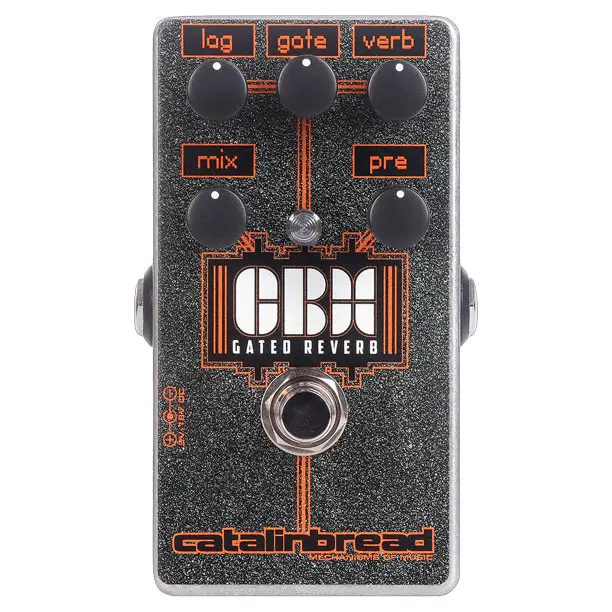
The Catalinbread CBX is the second pedal released this year that does something quite unusual for a stompbox: gated reverb. This is a type of reverb derived from a studio trick consisting in cuttin out the tail end of the effect abrubtly, creating an interesting angular reflection that works particularly well on drums. It had its heyday in the ’80s when Phil Collins pioneered it on some of his famous pop hits.
The CBX gives you full control over this very particular reverb, through controls for:
- Lag: a predelay between the hit and the first reflections
- Gate: governing the sensitivity of the gate, producing longer reverbs at lower settings and viceversa – remove it entirely at zero, to hear the full reverb.
- Verb: setting the lenght and thickness of the ungated reverb
- Pre: controlling the level of the preamp
- Mix: wet/dry blend
Hear how it sounds in the videos below.
Catalinbread CBX Gated Reverb, Builder’s Notes
The CBX gives you full control over a classic studio trick popularized in the ‘80s by Phil Collins and Bruce Springsteen known as gated reverb. Originally, this involved an SSL console’s talkback mic channel fed back through the console preamp and into a noise gate.
In the primordial ooze of studio tricks, many recording engineers had to invent their own effects. Double tracking and flanging started as manual manipulations of magnetic tape and the machinery used to process it. One such effect is gated reverb, the combination of digital reverb and noise gate, “invented” in the ‘70s but popularized in the ‘80s by one Phil Collins. Like many now-legendary effects, gated reverb was invented by accident using the Solid State Logic SL4000 Talkback Mic channel and AMS RMX16 digital reverb units. The premise is simple enough: the gate is a function of the signal strength; once the signal level drops below an adjustable threshold, the reverb tail snaps shut. Our CBX recreates this magical symbiosis with an overdrivable preamp, adjustable reverb lag time and a full wet-dry blend. The result is a lovely and expressive “always-on” reverb that stays in its lane and won’t interfere with the all-important mix.
Lag: This adjusts the delay between the original note played and the onset of the gate. You can use the lower half of the control to fine-tune your picking attack, and just past noon gives you slapback and reverse-esque sounds. Think of it as a pre-delay control for the gate.
Gate: Controls the sensitivity of the gate. Keep this low for the least amount of gating and longest reverb trails, turn up for running higher gain devices before or making the effect more subtle. When the Gate knob is all the way down, the gate is removed from the circuit. This can be manipulated with your guitar’s volume control by lowering the signal level and forcing the gate to clamp shut.
Mix: Controls the balance between dry and wet signals. When set to its minimum, you will hear just the dry signal fed through the preamp. At maximum, the reverberated signal is the only thing present.
Verb: On a reverb pedal with no gate, this would control how long the reverb tail rings out. But since there’s a gate, this essentially governs the thickness of the reverb. Setting this knob low gives some mild reverberation and maxing it out gives a huge, harmonically rich reverb sound.
Pre: Controls the level of the onboard preamp.






















